The 2019 Tsinghua-Colombia Annual Forum on Cyber Law, co-organized by Tsinghua Law School and Columbia Law School, was held at Tsinghua on May 8, 2019.
Experts and scholars from Tsinghua University, Columbia University, King's College London, Peking University, Xi’an Jiaotong University, Beijing University of Posts and Telecommunications,Beijing Normal University and other renowned universities are invited to this forum. Besides, Deputy Chief Judge from the Intellectual Property Court of the Supreme People's Court, legal practitioners from Alibaba, Microsoft and leading law firms participated in the forum for discussion and in-depth dialogue around the theme of "the governance of digital economy".
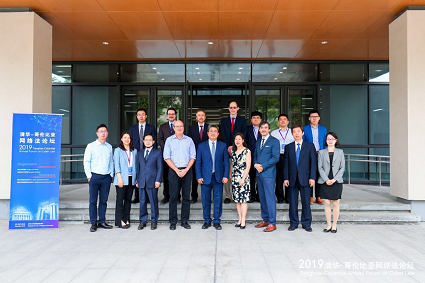
Group Photo
Dean SHEN Weixing of Tsinghua Law School, Professor Benjamin L. Liebman of Columbia Law School and General Counsel Timothy A. Steinert of Alibaba attended the Forum and delivered welcome speeches.
Dean SHEN said that Tsinghua Law School will focus on the development of interdisciplinary research in law and information technology in the future, and the cooperation with Columbia University in the field of cyber law will vigorously promote the construction of computational law program at Tsinghua. He expressed his sincere gratitude to Prof. Liebman and his colleagues from Columbia Law School and welcome all the participants to the Forum.

Welcome speech by Dean and Professor Shen Weixing
Benjamin L. Liebman believed that this forum will provide a platform where scholars can communicate and exchange ideas on Chinese and US legal system. He thanked Alibaba for their great support to the Forum.
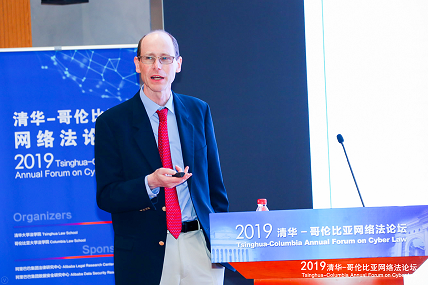
Welcome speech by Professor Benjamin L. Liebman
Mr. Timothy A. Steinert believes that the collaborative research of cyber experts between China and the United States will bring impetus to the development of common recognized Internet regulations, standards and concepts and the development of the global Internet.
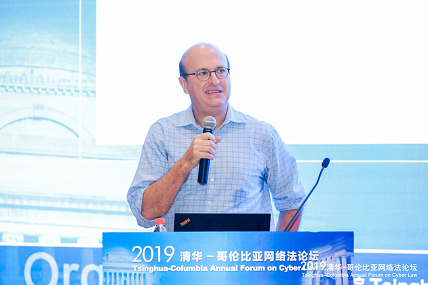
Welcome speech by General Counsel Timothy A. Steinert of Alibaba
The forum consists three sections, and each section has a unique topic, including "AI, Innovation & Law", "Internet & IP", "Big Data & Cyber Security". Presentations and discussions are delivered on issues including but not limited to the application of artificial intelligence in the judicial system, the protection of big data, ISP’s intermediary liabilities, central bank’s digital currency, and cyber security.
With Dean SHEN Weixing as the moderator, Deputy Chief Judge Zhou Xiang of the Intellectual Property Court of the Supreme People’s Court and Julius Silver Professor Timothy Wu of Columbia Law School, delivered keynote speeches to convene the following presentation and discussion.
Deputy Chief Judge ZHOU Xiang briefly introduced China's strengthening intellectual property protection in the context of the digital economy, indicating that China is constantly improving its specialized IP court system to actively address the challenges posed by the new round of industrial revolution.
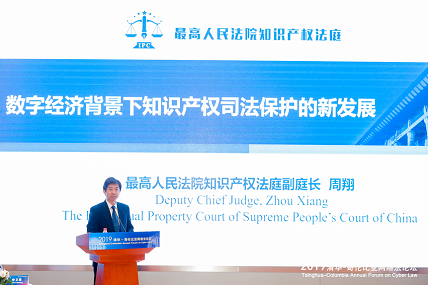
Keynote speech by Deputy Chief Judge Zhou Xiang
Professor Timothy Wu discussed whether and how antitrust law should be applied to regulate technology platforms. He compared the development of US and Japanese companies from 1975 to 2000, and explained the importance of antitrust policy for a country.
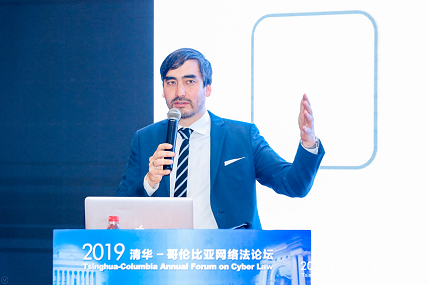
Keynote speech by Professor Timothy Wu
The first session “AI, Innovation & Law” was chaired by Professor HE Haibo of the Law School of Tsinghua University.
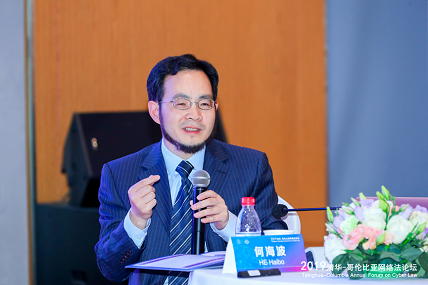
Professor He Haibo as the moderator
Professor Benjamin L. Liebman of Columbia Law School explained the challenges and concerns of the artificial intelligence application in the US legal system. Those challenges include the accuracy of algorithms in sentencing and parole, algorithmic transparency and whether due process is violated.
Dean SHEN Weixing analyzed China's future data protection system, saying that contracts, algorithms and laws should become regulatory tools of artificial intelligence governance. Referring to the Draft Law of Personality Rights, Dean Shen discussed the conflict between the requirement of algorithm transparency and the protection of trade secrets, and the legal nature of rights in personal data. He suggested that the protection of personal data should be combined with the protection of personality and property rights. China should adopt laws, technical standards and implementing regulations together to build a system of data protection.
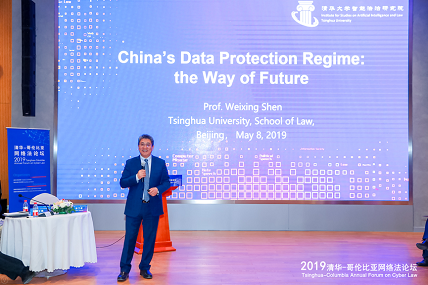
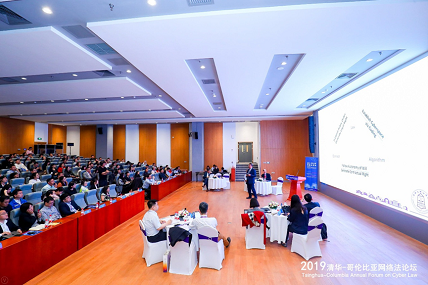
Presentation by Dean & Professor SHEN Weixing
Associate Professor ZHANG Min from Department of Computer Science and Technology, Tsinghua University, discussed the user satisfaction and fairness in personalized recommendation. She believes that the quality and diversity of information will cause fairness concerns. She suggested that in order to solve the issue of fairness, we should take factors into consideration, incorporate fairness into recommendation algorithms and improve evaluation metrics.
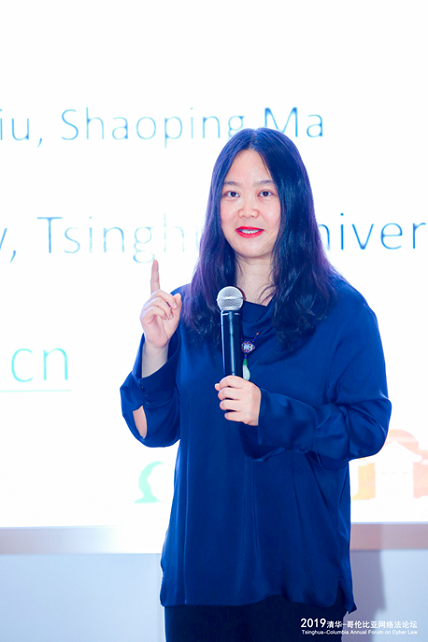
Presentation by Associate Professor Zhang Min
Associate Professor GAO Shimin of Tsinghua Law School has studied China’s Central Bank’s digital currency from the perspective of limited rationality and network power. She thinks that because the central bank digital currency essentially changes the original privatization payment and monetary system, the society needs to promote the development of digital currency. This, on one hand, will allow the government to have more central and effective control over the economy and bring about some social welfare, on the other hand, is a great challenge to personal privacy and property rights. The development of central bank digital currency t depends to a large extent on whether the major economies will choose digital currencies to produce network effects.
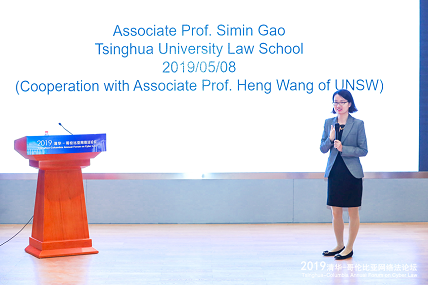
Presentation by Associate Professor Gao Simin
At the end of the first session, Associate Professor LIU Yan of Tsinghua Law School and Professor YANG Ming of Peking Law School commented on the presentations in this session. Associate Professor LIU Han suggested that both artificial intelligence and law should be explainable and a mechanism for accountability should be established. Professor YANG Ming proposed the phenomenon of the entitlement of data ownership and algorithm discrimination, and pointed out that the controlling of information disclosure, and algorithm-based prediction and intervention should be regulated through proper legislations.
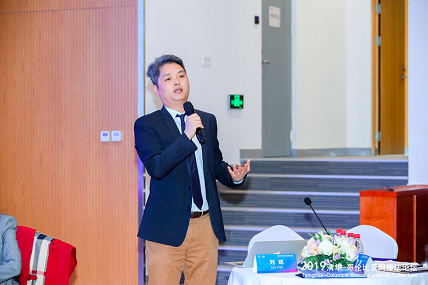
Commentator Associate Professor Liu Han
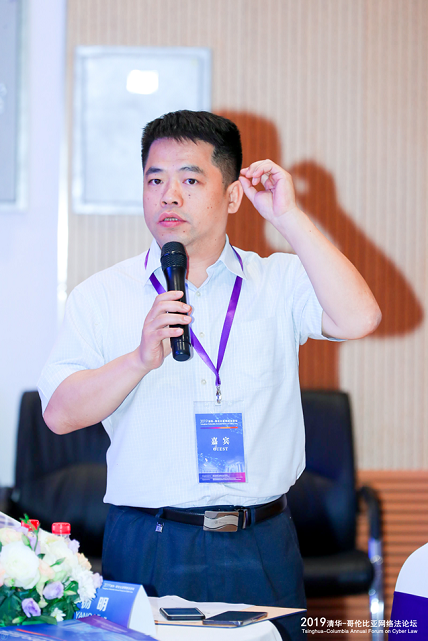
Commentator by Professor Yang Ming
The second session of the Forum, "Internet & IP", was moderated by Professor Timothy Wu of Columbia Law School.
Colleen v. Chien, Visiting Professor at Columbia Law School and Professor of Law in Santa Clara University, said AI was an emerging technology area. Therefore, AI governing law and policies should be in place as soon as possible. Her presentation covers various emerging issues on AI governance, such as the regulation of autonomous vehicles, privacy, civil liberties and AI, and IP protection for big data.
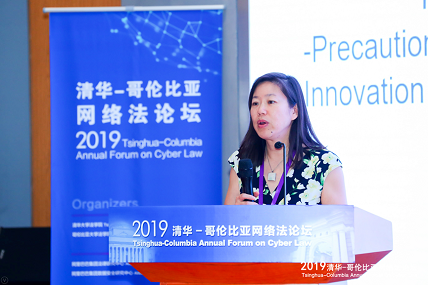
Presentation by Professor Colleen V. Chien
Professor Frederick Mostert from School of Law, King's College London believes that challenges of the digital age require a new perspective on law making. In the Q&A session, Professor Frederick Mostert, in response to the participants' questions, pointed out that in the case of data disputes, future legislators should establish procedural provisions to achieve a unified dispute resolution mechanism.
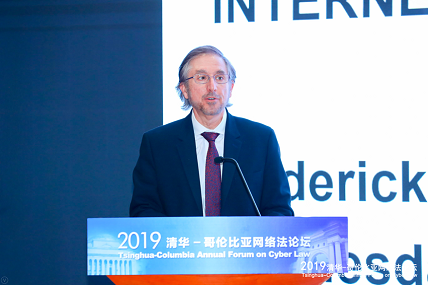
Presentation by Professor Frederick Mostert
Associate Professor FENG Shujie of Tsinghua Law School discussed how the shift from Copyright Law to Chinese E-Commerce Law poses an unnecessary disturbance to E-Commerce. He believed that the notice and take-down procedure adopted by E-Commerce Law will harm the development of E-Commerce in China and should be reformed. And he suggested that Chinese regulators should rely more on platform competition based on market mechanism. An automatic filtering mechanism might be an answer to the rampant piracy in e-commerce.
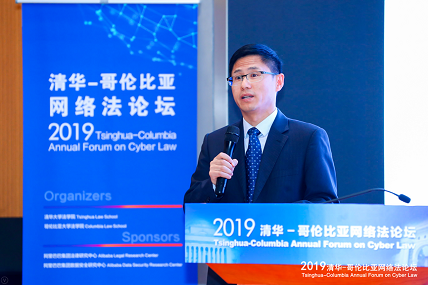
Presentation by Associate Professor Feng Shujie
From the legal point of view of Property Law, Associate Professor JIANG Ge of Tsinghua Law School said that it was more difficult to define the property right of information than the traditional tangible property. She proposed to standardize the types of copyrightable subject matters, and at the same time expand the scope of fair use doctrine in China.
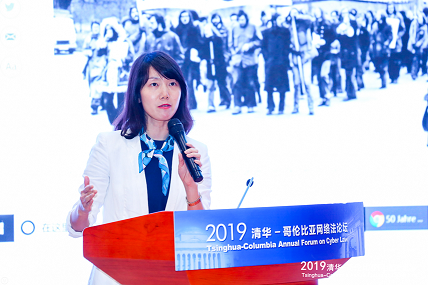
Presentation by Associate Professor Jiang Ge
At the end of this section, Mr. ZHAO Ye, Senior Partner of Jingtian & Gongcheng LLP and Associate Professor and Associate Dean CUI Guobin of Tsinghua Law School expressed their understanding. Mr. ZHAO Ye believed that a comprehensive framework should be established to combat IP infringing activities on e-commerce platforms. Associate Dean CUI Guobin said that IP owners and the public’s interests in every area of e-commerce is different and extremely fine rules are required to strike a balance. A very broad rule like that in the e-commerce law can easily break the tie of interests and cause negative consequences. Lawmakers should avoid trying to cover all the areas with a common and broad rule.
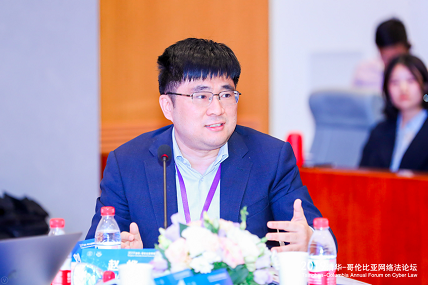
Commentator Zhao Ye
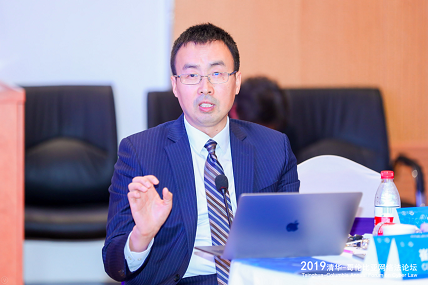
Commentator Associate Professor Cui Guobin
The third session of the Forum, "Big Data & Cyber Security", was moderated by Professor Benjamin L. Liebman of the Columbia Law School and Director of the Centre for Chinese Legal Studies.
Matthew C. Waxman, Liviu Librescu Professor and the Faculty Chair of Columbia Law School’s National Security Law Program , discussed cyber security issues in conjunction with key infrastructure protection, the updated surveillance law, government bureaucracy, international law and international norms. He made recommendations for the introduction of cyber security laws in the United States.
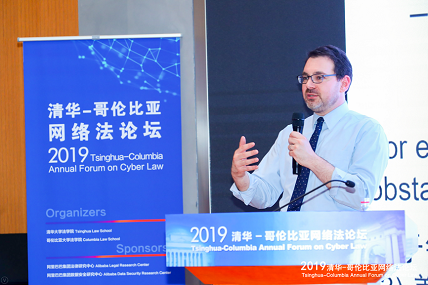
Presentation by Professor Matthew C. Waxman
Professor MA Minghu of Xi'an Jiaotong University analyzed the development trend of China's cyber security law, and then mainly focused on the development of CIA and capacity building, the transition from IT security to OT security, the development of risk analysis and threat perception. He explained that China has already established a cyber-security legal framework. While gradually improving the industry penetration of the cyber security law, we should focus more on building procedural law norms in the coming future. China would develop its cyber security legal system in a positive, open and innovative manner.
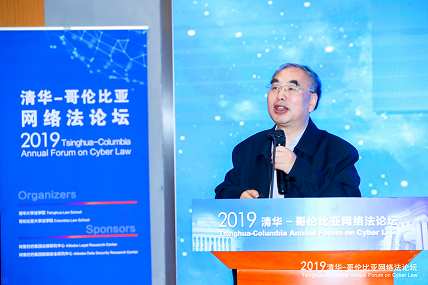
Presentation by Professor Ma Minhu
Larry LIU, Senior Advisor of Alibaba Legal Research Center discussed the challenges in data protection from an intra-firm daily operation perspective. Issues discussed include how to continuously ensure privacy protection in the agile development context, internal communication and talent management issues.
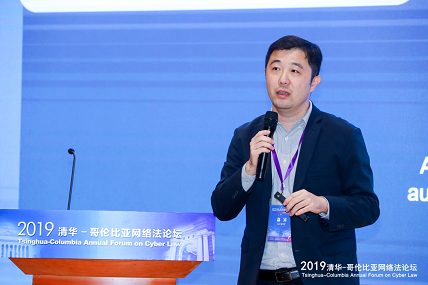
Presentation by Larry Liu
General Manager Kevin LUO of the Asia R & D Group Legal Department, Microsoft introduced the current situation of cyber security and proposed six principles on government application of face recognition technology: fairness, transparency, accountability, non-discrimination, notification and notice, and legal application.
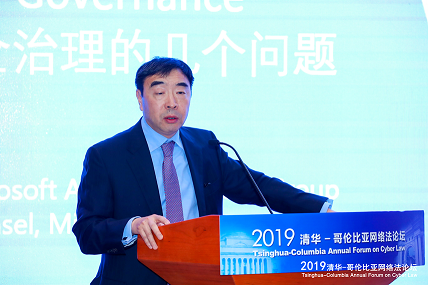
Presentation by Kevin Luo
At the end of the session, Associate Dean and Associate Professor XIE Yongjiang from School of Humanities of Beijing University of Posts and Telecommunications and Associate Professor and Director WU Shenkuo of International Centre of Cyber Law of Beijing Normal University gave wonderful comments on the presentations. Associate Professor Xie said that the establishment of international rules in cyberspace required the joint efforts of all countries, and Associate Professor Wu summed up some common phenomena in the process of big data and cyberspace governance in China.
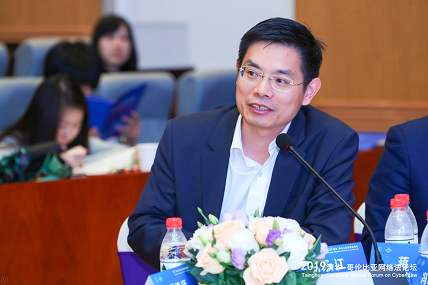
Commentator Associate Professor Xie Yongjiang
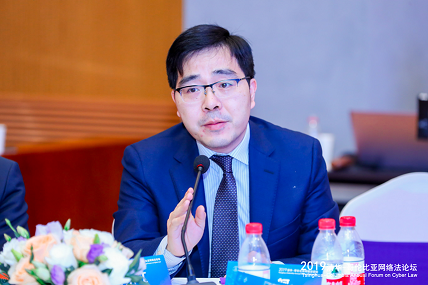
Commentator Professor Wu Shenkuo
At the end of the Forum, Dean SHEN Weixing made the closing remarks. Dean SHEN expressed his sincere gratitude to Professor Benjamin L. Liebman and all the Columbia professors, Alibaba Group, Mr. Timothy A. Steinert, all the speakers and commentators. He congratulated the successful convention of the Tsinghua-Columbia Annual Forum on Cyber Law.
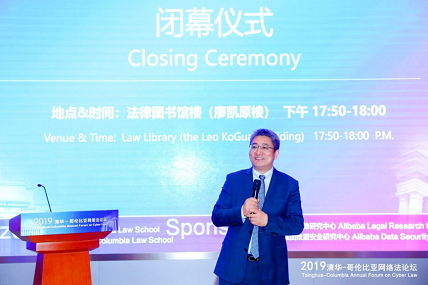
Closing remarks by Dean Shen Weixing


